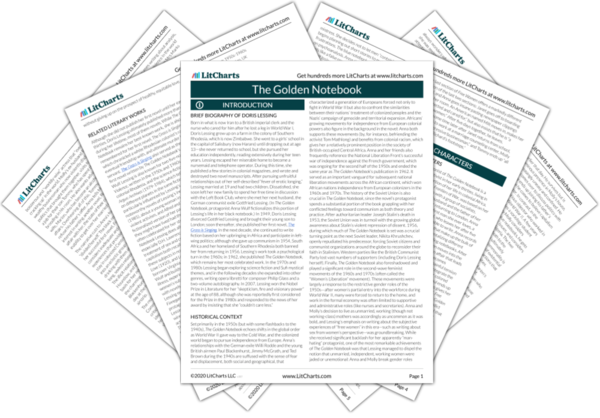Molly Jacobs Quotes in The Golden Notebook
“The point is,” said Anna, as her friend came back from the telephone on the landing, “the point is, that as far as I can see, everything’s cracking up.”
Anna laughed. “Men. Women. Bound. Free. Good. Bad. Yes. No. Capitalism. Socialism. Sex. Love …”
“It seems to me like this. It’s not a terrible thing — I mean, it may be terrible, but it’s not damaging, it’s not poisoning, to do without something one wants. It’s not bad to say: My work is not what I really want, I’m capable of doing something bigger. Or I’m a person who needs love, and I’m doing without it. What’s terrible is to pretend that the second-rate is first-rate. To pretend that you don’t need love when you do; or you like your work when you know quite well you’re capable of better. It would be very bad if I said, out of guilt or something: I loved Janet’s father, when I know quite well I didn’t. Or for your mother to say: I loved Richard. Or I’m doing work I love …”
15th September, 1954
A normal day. During the course of a discussion with John Butte and Jack I decided to leave the Party. I must now be careful not to start hating the Party in the way we do hate stages of our life we have outgrown. Noted signs of it already: moments of disliking Jack which were quite irrational. Janet as usual, no problems. Molly worried, I think with reason, over Tommy. She has a hunch he will marry his new girl. Well, her hunches usually come off. I realized that Michael had finally decided to break it off. I must pull myself together.
“Isn’t it odd, Anna? He’s been hovering between life and death. Now he’s going to live. It seems impossible he shouldn’t. But if he had died, then I suppose we’d have felt that was inevitable too?”
“Write down: The two women were alone in the London flat.” […] “On a dry hillside in Algeria, the soldier watched the moonlight glinting on his rifle.”

Molly Jacobs Quotes in The Golden Notebook
“The point is,” said Anna, as her friend came back from the telephone on the landing, “the point is, that as far as I can see, everything’s cracking up.”
Anna laughed. “Men. Women. Bound. Free. Good. Bad. Yes. No. Capitalism. Socialism. Sex. Love …”
“It seems to me like this. It’s not a terrible thing — I mean, it may be terrible, but it’s not damaging, it’s not poisoning, to do without something one wants. It’s not bad to say: My work is not what I really want, I’m capable of doing something bigger. Or I’m a person who needs love, and I’m doing without it. What’s terrible is to pretend that the second-rate is first-rate. To pretend that you don’t need love when you do; or you like your work when you know quite well you’re capable of better. It would be very bad if I said, out of guilt or something: I loved Janet’s father, when I know quite well I didn’t. Or for your mother to say: I loved Richard. Or I’m doing work I love …”
15th September, 1954
A normal day. During the course of a discussion with John Butte and Jack I decided to leave the Party. I must now be careful not to start hating the Party in the way we do hate stages of our life we have outgrown. Noted signs of it already: moments of disliking Jack which were quite irrational. Janet as usual, no problems. Molly worried, I think with reason, over Tommy. She has a hunch he will marry his new girl. Well, her hunches usually come off. I realized that Michael had finally decided to break it off. I must pull myself together.
“Isn’t it odd, Anna? He’s been hovering between life and death. Now he’s going to live. It seems impossible he shouldn’t. But if he had died, then I suppose we’d have felt that was inevitable too?”
“Write down: The two women were alone in the London flat.” […] “On a dry hillside in Algeria, the soldier watched the moonlight glinting on his rifle.”











